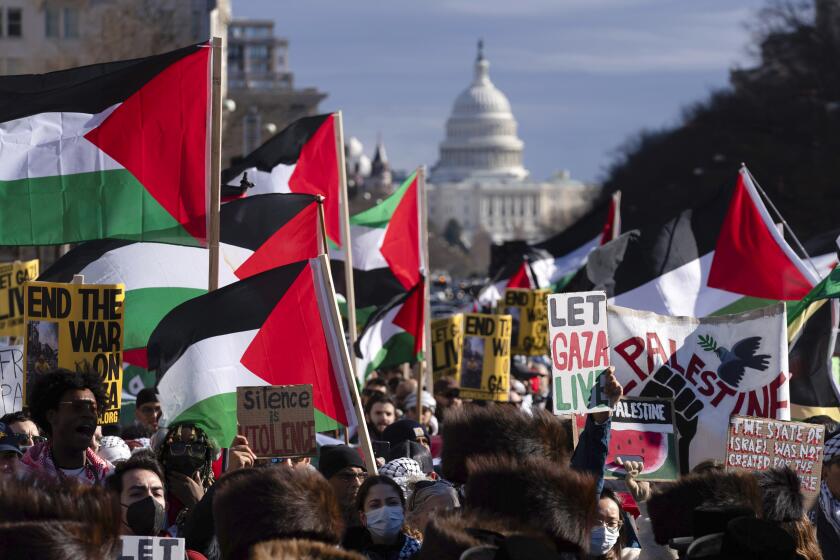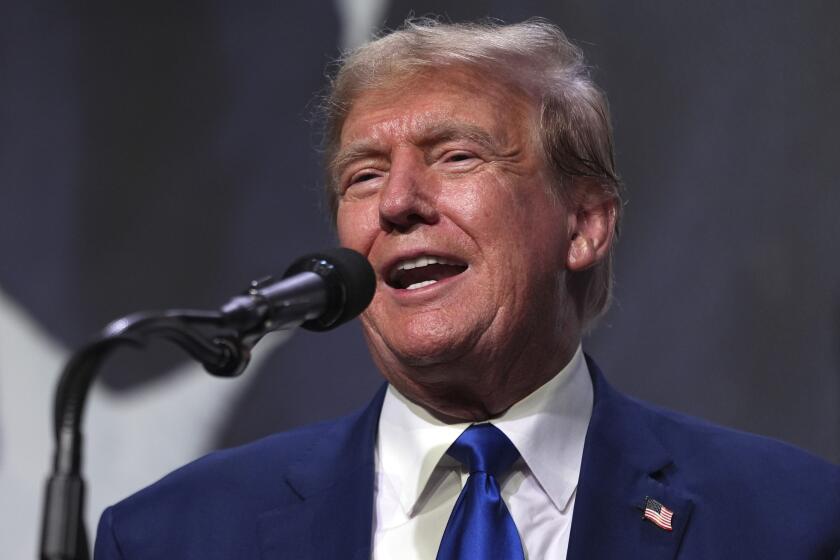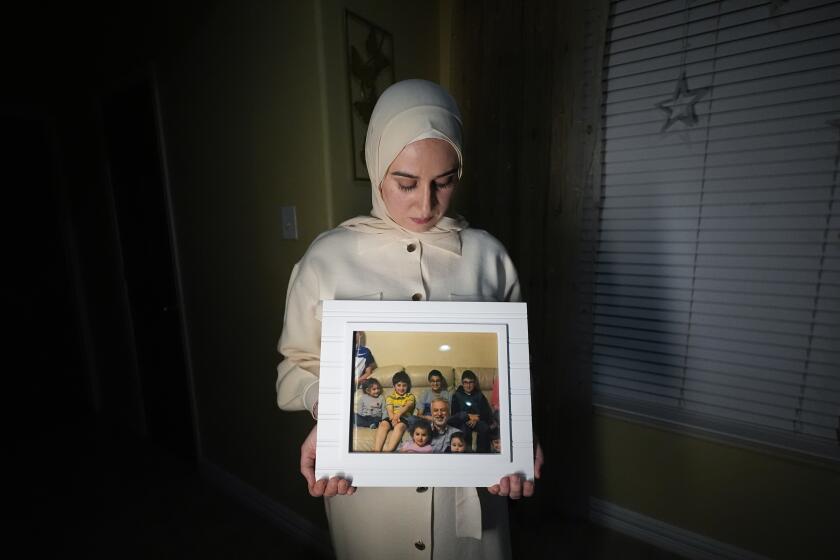Labor Chief Wants Out of Israeli Coalition
The new head of Israel’s Labor Party declared Thursday that he intended to pull out of Prime Minister Ariel Sharon’s governing coalition, setting the stage for a period of political disarray that could bog down Israeli-Palestinian peacemaking efforts.
“We will inform the prime minister that we wish to separate,” Amir Peretz, best known for leading Israel’s biggest trade federation, said hours after his unexpected victory over veteran statesman Shimon Peres in the contest for party leadership.
If the 53-year-old Peretz follows through on his pledge to abandon Sharon’s coalition, it will almost certainly trigger an early general election. Balloting had not been scheduled to take place until November 2006.
The prime minister would be hard-pressed to form a new coalition that could withstand frequent parliamentary challenges from right-wing rivals, including those within his Likud Party, who are still simmering with anger about Israel’s late-summer withdrawal from the Gaza Strip.
However, Peretz could encounter strong opposition within his party, particularly from senior members who hold Cabinet posts in the Sharon government. They might seek to prevent him from breaking with the coalition, a move that would cost them their jobs.
Peretz is to meet with Sharon on Sunday. Analysts predicted that the prime minister would either try to woo Labor into a renewed alliance or accept the party’s departure and open negotiations on a new election date.
Upheaval is a near-constant in Israeli politics, but the 82-year-old Peres’ abrupt fall from power and the overnight ascent of a relative neophyte left many observers stunned. Israeli pollster Hanan Kristal described Peretz’s unexpected victory as “an 8 or 9 on the political Richter scale.”
The primary results not only rattled the political establishment but sent tremors through Israel’s financial sector. The Tel Aviv stock exchange and the Israeli currency, the shekel, both fell sharply Thursday on the news of Peretz’s win, though they later stabilized.
That nervousness stemmed partly from Peretz’s fiery calls for an end to the free-market policies championed over the last two years by Sharon’s government, particularly former Finance Minister Benjamin Netanyahu. Peretz argued that the pain of stringent economic reforms had fallen too heavily on some of the most vulnerable groups: pensioners, single parents and the poor.
Peres, a Nobel Peace Prize laureate, is widely respected internationally but derided by domestic critics for a seemingly intractable inability to connect with voters. Although he has served as prime minister twice, he has never won an election to the post.
“What is this curse that hovers over him, leading to loss after loss, humiliation after humiliation?” political columnist Yossi Verter wrote in Thursday’s online editions of the Haaretz newspaper. “Why is he unable to win, even when the polls predict a victory?”
Peres has been serving as a deputy premier in Sharon’s government for nearly a year, focusing much of his recent attention on efforts to rebuild the ruined Palestinian economy in the wake of the Gaza withdrawal.
Analysts said Peres was hurt in the party race by a low turnout and the fact that although he is generally respected within the ranks, his support tends not to be passionate. Peretz, on the other hand, used his union background to mobilize committed backers.
The two rivals could hardly be more different in demeanor. Peres is cultivated, grandfatherly and dignified in contrast to the loud Peretz.
Adding to the sting of defeat for Peres, he had been his rival’s political mentor, bringing him into Labor after Peretz’s small party folded.
Israeli media reported that Peres made no congratulatory call to Peretz when the final results were tallied. After the vote, the elder politician said only: “I expected a better evening.”
Later, at an economic forum, Peres said he would have preferred to devote the period before next November to peacemaking, not electioneering.
“May I remark that in my opinion, we don’t have enough of a stable government in Israel,” he said.
Peretz insisted that in addition to addressing social ills, his party would pursue a peace accord.
“We will not rest until we reach a permanent agreement that will secure a safe future for our children,” he said during a visit to the grave of Prime Minister Yitzhak Rabin, who was assassinated 10 years ago.
The new party chief did get a pledge of loyalty from Binyamin Ben-Eliezer, who ran a distant third in the leadership race. Ben-Eliezer garnered 17% of the vote, to 42% for Peretz and 40% for Peres.
Under Israeli law, if Sharon and Peretz agreed to an early election, a bill dissolving the Knesset, or parliament, could be passed with relative speed. That would start a 90-day countdown to the vote.
More to Read
Start your day right
Sign up for Essential California for news, features and recommendations from the L.A. Times and beyond in your inbox six days a week.
You may occasionally receive promotional content from the Los Angeles Times.






